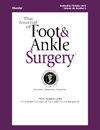Rejection rate, modifications, and turnaround time for patient specific instrumentation plans in total ankle replacement
IF 1.3
4区 医学
Q2 Medicine
引用次数: 0
Abstract
Patient specific instrumentation (PSI) in total ankle replacement (TAR) has been reported to be accurate and time saving. However, there has been criticism regarding accuracy and an overreliance on the preoperative plan. This is a retrospective review of a single surgeon's PSI plans from 2016-2024. We report rejection rates, modifications, and turnaround time. A total of 101 plans were reviewed and found an overall rejection rate of 17.8 %, with 18 reports rejected. Average turnaround time was 29:07 hours. When comparing the 1st half of the study period to the second half, a statistically significant increase in rejection rate was found, 0 % to 45 %, p < 0.0001. In addition, there was a higher rate of rejection on more complicated stemmed implants or revision implants compared to low profile implants. This report shows there is not a blind trust of the engineer's plan, and with experience with PSI rejection rate increases. Also, the engineer's understanding of complicated cases is addressed with higher rates of rejection in complicated cases. This report refutes charges that surgeons that use PSI for TAR are overly reliant on CT-derived engineer produced plans. Further studies with national data or multiple surgeons should be undertaken to explore this further.
全踝关节置换术中患者特定器械计划的拒绝率、修改和周转时间。
据报道,全踝关节置换术(TAR)中患者特定内固定(PSI)准确且节省时间。然而,对于准确性和对术前计划的过度依赖一直存在批评。这是对2016-2024年单个外科医生PSI计划的回顾性审查。我们报告拒绝率、修改和周转时间。共审查了101份方案,发现总体拒绝率为17.8%,其中18份报告被拒绝。平均周转时间为29:07小时。当将研究前半期与后半期进行比较时,发现排异率有统计学意义上的显著增加,0%到45%,p
本文章由计算机程序翻译,如有差异,请以英文原文为准。
求助全文
约1分钟内获得全文
求助全文
来源期刊

Journal of Foot & Ankle Surgery
ORTHOPEDICS-SURGERY
CiteScore
2.30
自引率
7.70%
发文量
234
审稿时长
29.8 weeks
期刊介绍:
The Journal of Foot & Ankle Surgery is the leading source for original, clinically-focused articles on the surgical and medical management of the foot and ankle. Each bi-monthly, peer-reviewed issue addresses relevant topics to the profession, such as: adult reconstruction of the forefoot; adult reconstruction of the hindfoot and ankle; diabetes; medicine/rheumatology; pediatrics; research; sports medicine; trauma; and tumors.
 求助内容:
求助内容: 应助结果提醒方式:
应助结果提醒方式:


